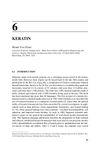 15 citations,
January 2010 in “Experimental Dermatology”
15 citations,
January 2010 in “Experimental Dermatology” Hair loss in certain young mice is linked to a specific gene and can be caused by lack of iron.
 12 citations,
February 2014 in “Recent Patents on Inflammation & Allergy Drug Discovery”
12 citations,
February 2014 in “Recent Patents on Inflammation & Allergy Drug Discovery” Shampoos have evolved into multifunctional products with patented innovations for different hair needs and can include medicinal herbs for hair and scalp health.
[object Object]  10 citations,
July 2019 in “Journal of Asia-Pacific Entomology”
10 citations,
July 2019 in “Journal of Asia-Pacific Entomology” Different silkworm varieties have varying nutrient levels in their powders, which may promote hair growth.
 9 citations,
May 2021 in “Archives of Dermatological Research”
9 citations,
May 2021 in “Archives of Dermatological Research” Home-based skin care devices are generally safe and effective for hair removal, promoting hair growth, treating wrinkles and acne, but results for psoriasis treatment are mixed.
 9 citations,
September 2017 in “Nanoscale Research Letters”
9 citations,
September 2017 in “Nanoscale Research Letters” Graphene oxide helps deliver a skin healing agent over time, improving skin and hair follicle regeneration.
 7 citations,
December 2021 in “Pharmaceutics”
7 citations,
December 2021 in “Pharmaceutics” Natural products like plant extracts can help promote hair growth and could be used to treat hair loss.
 6 citations,
October 2016
6 citations,
October 2016 Understanding how keratin structures in hair are arranged and interact is key for creating methods to extract and purify them.
 5 citations,
February 2022 in “Acta Biomaterialia”
5 citations,
February 2022 in “Acta Biomaterialia” Nanomaterials can improve hair care products and treatments, including hair loss and alopecia, by enhancing stability and safety, and allowing controlled release of compounds, but their safety in cosmetics needs more understanding.
5 citations,
August 2021 in “Experimental dermatology” Overexpressing Merkel cell virus proteins in human hair follicles can create clusters of cells that resemble Merkel cell cancer.
3 citations,
July 2023 in “Acta Biomaterialia” PepACS offers a safer, eco-friendly way to perm, dye, and repair hair.
2 citations,
September 2022 in “World Rabbit Science” The WIF1 gene is crucial for hair growth in Angora rabbits.
 1 citations,
August 2024 in “Pharmaceuticals”
1 citations,
August 2024 in “Pharmaceuticals” Goat placenta extract in a special delivery system improved hair growth and thickness in chemotherapy patients.
 1 citations,
November 2023 in “Biomaterials advances”
1 citations,
November 2023 in “Biomaterials advances” Sponges made of soy protein and β-chitin with human cells from hair or fat can speed up healing of chronic wounds.
 1 citations,
August 2022 in “Molecules”
1 citations,
August 2022 in “Molecules” Prunus mira kernels contain components that can promote hair growth in mice.
1 citations,
April 2022 in “Journal of Ayurveda and integrative medicine” Blumea eriantha DC extract shows strong potential for promoting hair growth.
 November 2024 in “Stem Cell Research & Therapy”
November 2024 in “Stem Cell Research & Therapy” Stem cells from umbilical cords can help regrow hair in mice with hair loss.
FGF5 spliceosomes inhibit rabbit hair growth by affecting gene expression.
 March 2024 in “International journal of pharmaceutics. X”
March 2024 in “International journal of pharmaceutics. X” Spanlastic-laden nanogel could be a better way to deliver hair growth medication through the skin for treating hair loss.
February 2024 in “Animals” Hair loss peaks in spring and regrowth in late summer, with pregnant females losing the most hair.
 January 2024 in “Molecules (Basel. Online)”
January 2024 in “Molecules (Basel. Online)” Juglone from walnut extracts may help repair damaged hair.
 November 2023 in “Materials Today Bio”
November 2023 in “Materials Today Bio” Light therapy might help treat hereditary hair loss by improving hair follicle growth in lab cultures.

Nanocarriers with plant extracts show promise for safe and effective hair growth treatment.
 October 2023 in “Biomaterials”
October 2023 in “Biomaterials” Nanotechnology could improve hair regrowth but faces challenges like complexity and safety concerns.
 August 2023 in “Scientific reports”
August 2023 in “Scientific reports” Human stem cells were turned into cells similar to those that help grow hair and showed potential for hair follicle formation.

Custom skincare can be made based on genes, fewer cats in Lublin have FeLV/FIV than national average, and studies also looked at small water bodies, river pollution, guppy growth, toxins in biochars, palm oil issues, and pumpkin seed oil for hair strength.
 March 2023 in “Journal of Applied Biomedicine”
March 2023 in “Journal of Applied Biomedicine” Oleanolic acid improved hair growth in mice by affecting hair growth pathways and reducing inflammation.
 December 2022 in “International Research Journal Of Modernization In Engineering Technology And Science”
December 2022 in “International Research Journal Of Modernization In Engineering Technology And Science” Cosmeceuticals are special products that improve skin and hair health and have benefits like treating acne and wrinkles, protecting from the sun, and helping with dandruff and hair growth.
[object Object]  January 2022 in “Acta botanica Caucasica”
January 2022 in “Acta botanica Caucasica” Turkish herbal cosmetics use various plants for hair care, skincare, and other personal hygiene purposes.
 June 2021 in “bioRxiv (Cold Spring Harbor Laboratory)”
June 2021 in “bioRxiv (Cold Spring Harbor Laboratory)” KIF18B is important for correctly positioning cell division machinery in skin cells, affecting hair follicle development.
 October 2018 in “InTech eBooks”
October 2018 in “InTech eBooks” The most effective treatments for hair loss are minoxidil, finasteride, PRP, and hair transplants, with steroids and immunosuppressants for autoimmune types.
























